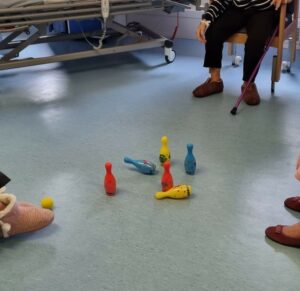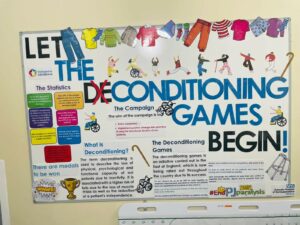Re-condition the Nation
Re-condition the Nation is a campaign designed to encourage health and care teams to work together to be creative in identifying and implementing ways to reduce de-conditioning.
A patient in hospital, or when recovering from an illness at home or care home, will be much less active than normal. This inactivity leads to ‘de-conditioning’, which causes people to lose fitness or muscle tone, especially through lack of exercise. It can also erode a person’s confidence undertaking simple things like walking.
The campaign launched across the Midlands in October 2022 and will officially close at the end of April. But it seems as though this campaign has had a lasting impact and a lot of the initiatives and support organisations have implemented are here to stay.
Let’s hear from a couple of Trusts from across the Midlands to see what great work they’ve been doing for the campaign.
First case study:
Sandwell and West Birmingham Hospitals NHS Trust
As part of the Re-condition the Nation campaign, Sandwell and West Birmingham Hospitals NHS Trust decided to introduce their Reconditioning Project Community Wards across their four Community Wards, which operate under the Primary Care Community and Therapies Group. Staff had seen an increase in patients being admitted who had experienced functional decline due to acute episodes of care. At the time there were very little therapeutic activity happening in the wards, so this campaign helped them focus on what was needed for their patients and staff.
From the start the project was as inclusive as possible in all activities, so that patients could participate regardless of being there for rehabilitation or discharge planning. The aim of the project was to improve patient experience and wellbeing, while also supporting and including carers.

Patients playing skittles at Sandwell and West Birmingham Hospitals NHS Trust
The wellbeing of staff, patients and their families have been enhanced through this project, which includes simple strength and balance exercises through fun activities such as playing skittles, playing catch with a beach ball, ping pong etc. Most days one ward may have 15-20 patients participating for a one-hour session. Bedside sessions are completed by patients unable to attend the day room session, so they didn’t miss out. The project was doing so well it was soon expanded across all four Community Wards (supporting 92 patients).
Justine Irish, Matron/Professional Nurse Advocate at Sandwell and West Birmingham NHS Trust said: “The difference Re-condition the Nation has made to us, and our teams/patients has been immeasurable. We have raised the awareness for staff and patients around the impact of functional decline and de-conditioning and how quickly both can take effect. Now our patients are up and dressed earlier, usually by 10:30am and ready to start sessions pre-lunch, building a healthy appetite for a hearty meal.
“Feedback from patients, carers and staff has been very positive too, they look forward to doing the sessions. The most recent comment from one man was how he looks forward to visiting his wife so he can take part too.
“Sitting time has reduced, step counts increased, and the amount of time people are moving has increased, our aim is to continue and build on what we started and hopefully encourage others to play their part in re-conditioning.”
Here’s one patient’s story about the impact the project had on his health and wellbeing.
A man had been admitted for rehabilitation following a lengthy acute episode of care due a fall at home and he was resisting engaging with any rehabilitative therapy. Conversations had moved from him being discharged home (pathway 1) to possibly being discharged to an enhanced assessment bed – where the patient will go for further therapy for up to six weeks, then a decision is made with regards to going home or placements such as residential or nursing homes (pathway 2).
Other patients were attending the day room for lunch and rehab sessions and each day this patient saw them and said it “wasn’t his thing” but through encouragement, this soon turned from popping along “for the chat and to break up the day” to eventually him wanting to take part. Attending these daily sessions transformed the patient’s ability to engage, reignited his commitment to his personalised care plan and the team supporting him to achieve it.
Taking part in these rehab sessions helped the man in many ways. He had become isolated during the pandemic, he felt he had lost his ability to communicate with others and he had lost the feeling that he had a place in the world. This all changed as soon as he started talking to staff and other patients every day. Then of course there are the physical improvements he saw. Until taking part he had not been able to lift his leg past a certain point, but this had changed and felt much better and more confident. His hard work and commitment, alongside the support of the team lead to a successful discharge to independence.
Second case study:
Northampton General Hospital NHS Trust
Talbot Butler Ward (oncology)

The Re-condition the Nation information board created by staff on the Talbot Butler Ward
As soon as staff on the Talbot Butler Ward read about Re-condition the Nation (known as The Deconditioning Games across the Trust), they recognised it could benefit their patients immensely. On this ward, patients often stay within the department for longer than most, some for more than six months, and this is not uncommon. Over time, many patients who are undergoing treatment, say they feel like they are losing their identity. The team encourage them to change into the clothes they would wear outside of the hospital environment to help them feel connected to their own identity and express themselves.
Due to their patient’s potential long stay, staff are very conscious about their patients maintaining good mobility levels and Re-condition the Nation has helped to support this. It is important patients continue to move and not de-condition, especially as anticancer treatment is so tough on the body and being as active as possible assists with their recovery post treatment.
The ward designed a Re-condition the Nation board to inform staff about the campaign and how it benefits patients. They also use healthy competition among staff that seems to be working very well. The staff member and team who have been able to assist and encourage the most patients during a week/month period win a prize, this is recognised and praised during the ward’s morning safety huddles and ward meetings. This has helped to motivate staff and help them feel valued, which in turn has a positive impact on patients.
Staff have put Movement Matrix Boards above every bed space showing what tasks the patient has completed that day. These boards help to remind staff to encourage and assist patients to get out of bed, dress in their own clothes and get them moving through chair exercises or promoting a light walk around the ward.
Marcella Irvine, Head of Therapies & Enablement Centre at Northampton General Hospital NHS Trust said: “Staff on the Talbot Butler Ward are very passionate about providing their patients with the very best care possible, and so by being part of the Re-condition the Nation campaign, we hope to develop the initiatives further and expand on the care we deliver.
“This campaign has reminded our staff just how important it is that every patient has the right to maintain their independence, their identity and their mobility, and as a ward we can help our patients to sustain this.”
